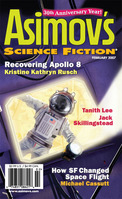
| Editor: | Sheila Williams |
| Issue: | Volume 31, No. 2 |
| ISSN: | 1065-2698 |
| Pages: | 144 |
On both the fiction and non-fiction side, this issue is noticably better than average. Brian Bieniowski writes a guest editorial about the Vance Integral Library, the sort of project that I love to see in SF. So far, all the complete works editions for various authors have been for authors that I don't quite care enough about to invest in, but I want to see the trend continue so that authors I am more interested in will receive the same treatment. Robert Silverberg also writes about Vance, an excellent retrospective on what Vance's books meant to him. I like columns of this kind far more than columns about random scientific trivia.
In other non-fiction there's an essay about the space program that managed to not annoy me (something of a feat, but one that Asimov's has managed several times), two reviews of the James Tiptree, Jr. biography by Julie Phillips (which can't get too much attention), and a generally good book column by Peter Heck.
"Outgoing" by Alex Wilson: The novelette of the issue, this story follows the converging paths of a poet who is picked to go into space as a publicity stunt for the space program and a brilliant inventor who has been obsessed with rocketry and space travel for his whole life. Wilson isn't afraid to poke fun at the space program and at astronauts through the eyes of a poet who doesn't take the same things seriously, while making good points about privacy, wonder, and the sort of space tourism that's meaningful. Chris Moser is a bit of a cliche; his hyper-competent secret space mission was hard to swallow and I never connected as much with his character. Tara Jones (the poet) makes the story, though, with her delightfully off-beat reactions and internal monologues. The ending twist was a bit too easy and predictable, but I loved the last line and the character dynamics and enjoyed the whole story more than I would have expected given the subject matter. (8)
"Cold Fire" by Tanith Lee: This short story is written in very strong dialect, which adds some character but made it difficult enough to read that I never got into it. When I'm having to spend too much time working out what the first-person narrator is even saying, it's hard to get swept away by descriptions of towing glass-clear iceberg and its mysterious inhabitant to the Arctic Circle. The plot arc here is mostly predictable, serving as a vehicle for some striking descriptions. Those descriptions aren't bad, but the combination of dialect and a weak plot turned me off. (5)
"The Chimera Transit" by Jack Skillingstead: I didn't like this story the first time I read it, but having thought about it more since, it's growing on me. It's a story of human emotion, about distance and involvement, and about making hard decisions. It doesn't have an easy ending, but I think it has an honest one. Skillingstead adds some memorable touches of world-building along the way (I particularly liked Flirts). There are some clunky bits, particularly around brand names, but I think this hit more than missed. (From the introduction, it may be even better for those familiar with the work of John Cheever, which I'm not.) (6)
"A Portrait of the Artist" by Charles Midwinter: Pixellation as an artistic technique isn't selling well. It's one fad behind, passed up by use of food as medium. Also, the building rats seem to have hands, and Chris's former girlfriend is being tailed by spooks. That's the opening of a quirky little story about interspecies understanding, acceptance, and positive karma. Midwinter doesn't go deeply into his world background, but I liked the bits and pieces that turned up and the ending twist was great. Good characterization and likeable people with only a twist of SF make for a solid, fun story. (7)
"Close" by William Preston: Ed goes to a local meeting for people with social anxiety, but the meeting and discussion start sounding decidedly odd. The reader figures out what's going on before Ed does and most of the story is built on awkward, nervous humor. That's not usually my cup of tea, but this is well done. Preston pulls off an audacious plot stunt with the end of the story, which increased my enjoyment of it considerably. (6)
"Recovering Apollo 8" by Kristine Kathryn Rusch: Rusch continues to cement her position as a writer to look forward to and one who demonstrates a solid grasp on human emotion. This story captures ambiguous feelings about the successes and failures of the space program better than any that I've read without either glorifying it or becoming too depressing. I could understand Richard's attitude towards a failed Apollo 8 mission in a slightly alternate universe, and while the last section of the story features far too unbelievable of coincidences, I think Rusch's psychology is spot on. Even her portrayal of genius here, while a bit over the top at times, includes obsession with odd significant events, a realistic emotional downside, and a corresponding toll on family relations. This is a good, thoughtful treatment of why we care so much about heroes. (8)
Reviewed: 2007-04-06